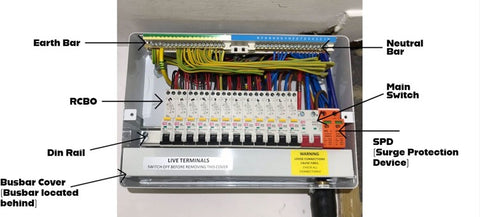Why Updating to Advanced RCBO CONSUMER UNITS is Vital for Safety
Why Updating to Advanced RCBO CONSUMER UNITS is Vital for Safety
Blog Article
The Role of Consumer Units in Efficient Power Administration Systems
Consumer devices are integral to effective power monitoring systems, serving as the primary circulation points for electric power within structures. The development of wise innovations has even more enhanced their functionality, allowing for real-time data monitoring and nuanced energy usage evaluation.
Understanding Consumer Devices

Understanding the role of customer units starts with identifying their important function in safeguarding electrical systems. By separating faults within details circuits, consumer devices prevent widespread outages and prospective fire dangers. This seclusion is achieved via making use of circuit breakers that trip or integrates that blow when a fault is found, consequently cutting off the electric flow to the influenced circuit.
In addition, customer systems promote the organized distribution of power, boosting the effectiveness of energy usage. They enable the methodical administration of electric tons, which can be especially important in industrial and industrial setups where demand can fluctuate significantly. Correctly maintained consumer systems add to the durability of electric systems and help in decreasing downtime brought on by electric failures, inevitably supporting the seamless operation of energy-dependent facilities.
Smart Technologies Integration

An essential advantage of wise consumer devices is their capability to utilize advanced algorithms and device discovering for predictive analytics. This enables preemptive adjustments based on use patterns, weather report, and various other variables, significantly boosting general effectiveness. In addition, smart consumer units promote need response programs, where energy usage can be dynamically adjusted throughout optimal durations to maintain the grid and decrease expenses.
The combination of eco-friendly energy sources, such as solar and wind, is additionally streamlined with wise consumer devices. By wisely handling the intermittency of these resources, these systems make sure a dependable and balanced power supply. Furthermore, clever consumer units improve user interaction by giving in-depth understandings and push-button control capabilities with mobile applications, promoting a more aggressive method to power conservation and sustainability.
Monitoring Power Intake
Building on the abilities of clever innovations integration, monitoring energy usage becomes a vital focus within power management systems. Efficient monitoring serves as the foundation for determining energy ineffectiveness and executing corrective steps. By leveraging advanced metering facilities (AMI), real-time data on power use can be accumulated at granular levels, supplying useful insights into consumption patterns Read Full Report and peak need periods. This data-centric method allows both customers and power supervisors to make educated choices targeted at reducing waste and enhancing overall performance.
Smart meters and Web of Points (IoT) devices play a critical role in this monitoring process. These gadgets can track energy usage in real-time, transmitting information to central systems for analysis.
The combination of these innovations not just equips consumers with in-depth information concerning their energy usage but likewise sustains utility suppliers in handling load distribution more efficiently. Ultimately, specific and continual tracking is important for accomplishing power effectiveness, expense savings, and sustainability objectives within power management systems.
Optimizing Home Appliance Use

One reliable approach involves recognizing peak and off-peak hours to move energy-intensive tasks, such as washing or dishwashing, to times when power demand is lower. This not just lessens strain on the grid however likewise maximizes reduced energy tariffs. In addition, integrating device discovering algorithms permits predictive maintenance, making sure appliances operate at optimum effectiveness and lengthening their life expectancy.
Energy management systems can also include user-specific choices and habits to tailor home appliance usage her response schedules. For instance, clever lighting systems can change brightness based upon occupancy and natural light accessibility, while a/c systems can keep convenience levels without excessive power usage.
Promoting Sustainability
Promoting sustainability within power monitoring systems includes not only enhancing efficiency yet also fostering eco liable methods. Customer units are essential to this process, as they offer real-time information and control devices that allow individuals to keep an eye on and reduce their power intake. By leveraging innovative modern technologies, customer devices can recognize energy-saving opportunities and help with the assimilation of renewable power sources like solar and wind power.
One vital aspect of promoting sustainability is informing consumers on the benefits of accountable power use. Through comprehensive understandings provided by consumer units, users can make enlightened choices that minimize their carbon impact. These systems can recommend optimum times for operating high-energy devices based on grid demand and eco-friendly energy schedule, therefore lowering dependence on fossil gas.
Furthermore, consumer systems support the adoption of smart grid technologies, which boost the total effectiveness and integrity of energy circulation. By enabling two-way interaction in between consumers and utility suppliers, these systems can dynamically adjust to power demands, minimizing waste and promoting making use of sustainable power practices.
Conclusion
Consumer systems, as important elements of power monitoring systems, significantly boost electrical safety and efficiency within buildings with circuit security and wise technology combination. Real-time data monitoring and evaluation assisted in by these units optimize energy consumption and appliance usage. Furthermore, the incorporation of sustainable power resources advertises lasting techniques, adding to decreased general energy intake and lower carbon footprints. As a result, customer systems play a crucial function beforehand both power performance and environmental Check This Out sustainability.
Advances in wise modern technologies have reinvented the capabilities of energy monitoring systems, particularly through the assimilation of wise consumer systems.Building on the capabilities of smart modern technologies assimilation, monitoring power intake comes to be an essential focus within power monitoring systems.Effective appliance usage optimization is a vital element of energy management systems, aiming to boost effectiveness and decrease unnecessary power intake.Consumer devices, as essential elements of power management systems, substantially enhance electric security and effectiveness within buildings with circuit defense and clever technology combination. Furthermore, the consolidation of renewable energy resources advertises sustainable techniques, contributing to reduced total power intake and reduced carbon footprints.
Report this page